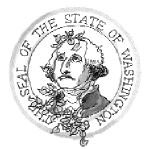THE ISSUE OF INVASIVE species “has polarized the gardening community,” Valerie Easton noted in a recent Seattle Times profile of world-renowned “plant explorer” Dan Hinkley, “because the chance of introducing the next kudzu will always conflict with the desire to find new plants.” Indeed, invasives—imported species that run amok— constitute the worst threat to biodiversity in many locales, especially tropical islands like Hawaii. And plant lovers have spread many a weed, from English ivy to Himalayan blackberries, just as bird lovers brought us starlings and English sparrows. American gardeners took to the kudzu vine after discovering it in a garden at the Japanese pavilion in the 1876 Centennial Exhibition. It soon escaped and, growing up to a foot a day, overran the South. Now, instead of talking about things that “grow like Topsy,” we say they “spread like kudzu.”
Forget the next kudzu, for a moment: The conquering vine itself has made it to Washington. The first known vine in the state appeared at Hazel Dell, near Vancouver, last fall, and it surely wasn’t the only one to cross the Columbia River. Kudzu infested three Oregon sites in 2000 after leapfrogging cross-continent from the Midwest, and it’s probably established there. The Hazel Dell vine didn’t get the sort of press that the state’s first West Nile virus sighting received last month, but if it grows as it has in the South, kudzu may prove harder to get rid of.
Easton notes that Hinkley, who operates the influential Heronswood Nursery in Kirkland, takes the issue quite seriously. He has “taken a stand against invasives in his catalog and hired an expert to analyze plants in advance for even the possibility of invasiveness.” Indeed, this botanical Frank Buck (Buck was the famous hunter of zoo animals whose motto was “Bring ’em back alive”), whom you might expect to be biodiversity Public Enemy No. 1, has done more than that. Hinkley was off hunting plants in Nepal last week, but the expert he’s enlisted, University of Washington invasive-plant authority Sarah Reichard, reports that “we found about 13 serious invasives on his list and he took them off. We also found about 180 potential invasives, which he’s marked ‘caution’ in his catalog.” Reichard adds that Hinkley decided on his own to stop shipping plants to Hawaii and likewise-vulnerable Florida, and took flak from gardeners there.
No big deal, says one Heronswood attendant: “It’s not really an economic issue—we don’t send much to those states anyway.” And no amount of screening can guarantee that an importer won’t introduce the next Al Qaeda of weeds. But these are still rare gestures in a profession too often given to defensive self-justification. “I consider him to be quite courageous,” says Reichard.









